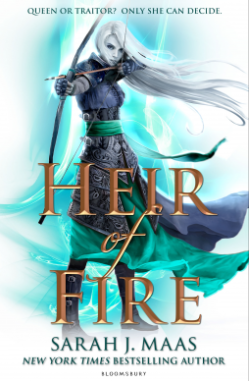Heir of Fire by Sara J
Maas
Review by Little M
(originally published on Manchee & Bones)
Heir of Fire is the third
instalment in Sarah J.Maas's series with Celaena Sarodthien as the main
character in a magical kingdom.
I highly recommend this series. As this is the third novel in the series I
haven't included much of a synopsis because it could be a huge SPOILER!
Celaena Sarodthien is an unbeatable assassin and the King of Adarlin's Champion. She is continuing her quest to fulfil her dying friend's wish and to find the dark secrets her king is hiding from everyone. Celaena is put to the test. She is pushed to her limits both physically and mentally. She gains a couple of friends along the way and one of them will stay with her forever.
I love this series by Sarah J.Maas; it is high on my favourite books list (the whole series). I loved Chaol in the first two novels but Rowan is now my favourite character with his dry sense of humour and witty comebacks. This third novel really turns the whole story around. This is positive as some books put a plot twister in, which doesn't quite fit. However, this book just made me want to keep reading and reading!
I would definitely recommend Heir of Fire to those who have read Sarah J.Maas and possibly fans of Harry Potter. It is a magical, thrilling novel, which most fantasising teens may like. Well, I did and so do many of my friends. The writing style is pretty straight forward, like many teen novels. Although, there is the odd phrase, which is used far too often. This could be slightly annoying for some but it didn't put me off. Altogether, this is a highly recommended magical series, which teens like me may like.
Celaena Sarodthien is an unbeatable assassin and the King of Adarlin's Champion. She is continuing her quest to fulfil her dying friend's wish and to find the dark secrets her king is hiding from everyone. Celaena is put to the test. She is pushed to her limits both physically and mentally. She gains a couple of friends along the way and one of them will stay with her forever.
I love this series by Sarah J.Maas; it is high on my favourite books list (the whole series). I loved Chaol in the first two novels but Rowan is now my favourite character with his dry sense of humour and witty comebacks. This third novel really turns the whole story around. This is positive as some books put a plot twister in, which doesn't quite fit. However, this book just made me want to keep reading and reading!
I would definitely recommend Heir of Fire to those who have read Sarah J.Maas and possibly fans of Harry Potter. It is a magical, thrilling novel, which most fantasising teens may like. Well, I did and so do many of my friends. The writing style is pretty straight forward, like many teen novels. Although, there is the odd phrase, which is used far too often. This could be slightly annoying for some but it didn't put me off. Altogether, this is a highly recommended magical series, which teens like me may like.
Publication Details: 11 September 2014, Bloomsbury, London (originally New York)
This copy: digital review copy from the publisher



